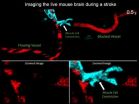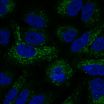Laser spectroscopy: a novel microscope for nanosystems
2015-06-25
(Press-News.org) Scientists from Ludwig-Maximilians-Universitaet (LMU) in Munich and the Max Planck Institute for Quantum Optics can image the optical properties of individual nanoparticles with a novel microscope.
Nanomaterials play an essential role in many areas of daily life. There is thus a large interest to gain detailed knowledge about their optical and electronic properties. Conventional microscopes get beyond their limits when particle size falls to the range of a few 10 nanometers where a single particle provides only a vanishingly small signal. As a consequence, many investigations are limited to large ensembles of particles. Now, a team of scientists of the Laser Spectroscopy Division of Nobel Laureate Professor Theodor W. Hänsch (chair for experimental physics at the Ludwig-Maximilians-Universität Munich and director at the Max Planck Institute of Quantum Optics) has developed a technique, where an optical microcavity is used to enhance the signals by more than 1000-fold and at the same time achieves an optical resolution close to the fundamental diffraction limit. The possibility to study the optical properties of individual nanoparticles or macromolecules promises intriguing potential for many areas of biology, chemistry, and nanoscience.
INFORMATION:
ELSE PRESS RELEASES FROM THIS DATE:
2015-06-25
The American Association for the Study of Liver Diseases (AASLD), in partnership with the Infectious Diseases Society of America (IDSA) and in collaboration with the International Antiviral Society-USA (IAS-USA), created online Recommendations for Testing, Managing, and Treating Hepatitis C in 2014 to aid practitioners treating patients infected with hepatitis C virus (HCV). Now an update to the Guidance, with a summary of recommendations regarding treatment with direct-acting antiviral drugs, is published in the AASLD journal, Hepatology.
HCV is a blood-borne virus ...
2015-06-25
(Philadelphia, PA) - In a life-threatening situation, the heart beats faster and harder, invigorated by the fight-or-flight response, which instantaneously prepares a person to react or run. Now, a new study by researchers at Temple University School of Medicine (TUSM) shows that the uptick in heart muscle contractility that occurs under acute stress is driven by a flood of calcium into mitochondria--the cells' energy-producing powerhouses.
Researchers have long known that calcium enters mitochondria in heart muscle cells, but the physiological role of that process was ...
2015-06-25
When neurons become active, they call for an extra boost of oxygenated blood -- this change in the presence of blood in different regions of the brain is the basis for functional brain scans. However, what controls this increase or decrease in blood supply has been a long-standing debate.
In a paper published on June 25 in Neuron, Yale University scientists present the strongest evidence yet that smooth muscle cells surrounding blood vessels in the brain are the only cells capable of contracting to control blood vessel diameter and thus regulate blood flow. This basic ...
2015-06-25
Think the nest of cables under your desk is bad? Try keeping the trillions of connections crisscrossing your brain organized and free of tangles. A new study coauthored by researchers at UC San Francisco and the Freie Universität Berlin reveals this seemingly intractable job may be simpler than it appears.
The researchers used high-resolution time-lapse imaging of the developing brains of pupal fruit flies (Drosophila melanogaster) paired with mathematical simulations to unravel a trick of neural wiring that had stumped neuroscientists for decades. They discovered ...
2015-06-25
Adult fruit flies given a cancer drug live 12% longer than average, according to a UCL-led study researching healthy ageing. The drug targets a specific cellular process that occurs in animals, including humans, delaying the onset of age-related deaths by slowing the ageing process.
The study published today in Cell and funded by the Max Planck Society and Wellcome Trust shows for the first time that a small molecule drug, which limits the effects of a protein called Ras, can delay the ageing process in animals. The treated fruit flies outlived the control group by staying ...
2015-06-25
Boston, MA -- A new study led by researchers at Harvard T.H. Chan School of Public Health finds that a malaria parasite protein called calcineurin is essential for parasite invasion into red blood cells. Human calcineurin is already a proven target for drugs treating other illnesses including adult rheumatoid arthritis and lupus, and the new findings suggest that parasite calcineurin should be a focus for the development of new antimalarial drugs.
"Our study has great biological and medical significance, particularly in light of the huge disease burden of malaria," said ...
2015-06-25
LA JOLLA--As a tumor grows, its cancerous cells ramp up an energy-harvesting process to support its hasty development. This process, called autophagy, is normally used by a cell to recycle damaged organelles and proteins, but is also co-opted by cancer cells to meet their increased energy and metabolic demands.
Salk Institute and Sanford Burnham Prebys Medical Discovery Institute (SBP) scientists have developed a drug that prevents this process from starting in cancer cells. Published June 25, 2015 in Molecular Cell, the new study identifies a small molecule drug that ...
2015-06-25
Washington, DC (June 25, 2015) - Comment sections on websites continue to be an environment for trolls to spew racist opinions. The impact of these hateful words shouldn't have an impact on how one views the news or others, but that may not be the case. A recent study published in the journal Human Communication Research, by researchers at the University of Canterbury, New Zealand, found exposure to prejudiced online comments can increase people's own prejudice, and increase the likelihood that they leave prejudiced comments themselves.
Mark Hsueh, Kumar Yogeeswaran, ...
2015-06-25
June 25 -- During the wars in Iraq and Afghanistan, U.S. combat support hospitals treated at least 650 children with severe, combat-related head injuries, according to a special article in the July issue of Neurosurgery, official journal of the Congress of Neurological Surgeons. The journal is published by Wolters Kluwer.
"Given the challenging environment and limited available resources, coalition forces were able to provide quality, timely, and life-saving care to many children" with severe head injuries, write Dr. Paul Klimo, Jr., of Semmes-Murphy Neurologic & Spine ...
2015-06-25
A large number of patients use online communication tools such as email and Facebook to engage with their physicians, despite recommendations from some hospitals and professional organizations that clinicians limit email contact with patients and avoid "friending" patients on social media, new research suggests.
The findings from Johns Hopkins Bloomberg School of Public Health researchers suggest a disconnect between what patients expect and what physicians -- concerned about confidentiality and being overwhelmed in off-hours -- are willing to do when it comes to online ...
LAST 30 PRESS RELEASES:
[Press-News.org] Laser spectroscopy: a novel microscope for nanosystems

